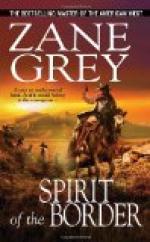Joe did wonderfully well, but he lacked, as nearly all white men do, the subtler, intuitive forest-instinct, which makes the Indian as much at home in the woods as in his teepee. Wetzel had this developed to a high degree. It was born in him. Years of training, years of passionate, unrelenting search for Indians, had given him a knowledge of the wilds that was incomprehensible to white men, and appalling to his red foes.
Joe saw how Wetzel used this ability, but what it really was baffled him. He realized that words were not adequate to explain fully this great art. Its possession required a marvelously keen vision, an eye perfectly familiar with every creature, tree, rock, shrub and thing belonging in the forest; an eye so quick in flight as to detect instantly the slightest change in nature, or anything unnatural to that environment. The hearing must be delicate, like that of a deer, and the finer it is, the keener will be the woodsman. Lastly, there is the feeling that prompts the old hunter to say: “No game to-day.” It is something in him that speaks when, as he sees a night-hawk circling low near the ground, he says: “A storm to-morrow.” It is what makes an Indian at home in any wilderness. The clouds may hide the guiding star; the northing may be lost; there may be no moss on the trees, or difference in their bark; the ridges may be flat or lost altogether, and there may be no water-courses; yet the Indian brave always goes for his teepee, straight as a crow flies. It was this voice which rightly bade Wetzel, when he was baffled by an Indian’s trail fading among the rocks, to cross, or circle, or advance in the direction taken by his wily foe.
Joe had practiced trailing deer and other hoofed game, until he was true as a hound. Then he began to perfect himself in the art of following a human being through the forest. Except a few old Indian trails, which the rain had half obliterated, he had no tracks to discover save Wetzel’s, and these were as hard to find as the airy course of a grosbeak. On soft ground or marshy grass, which Wetzel avoided where he could, he left a faint trail, but on a hard surface, for all the traces he left, he might as well not have gone over the ground at all.
Joe’s persistence stood him in good stead; he hung on, and the more he failed, the harder he tried. Often he would slip out of the cave after Wetzel had gone, and try to find which way he had taken. In brief, the lad became a fine marksman, a good hunter, and a close, persevering student of the wilderness. He loved the woods, and all they contained. He learned the habits of the wild creatures. Each deer, each squirrel, each grouse that he killed, taught him some lesson.
He was always up with the lark to watch the sun rise red and grand over the eastern hills, and chase away the white mist from the valleys. Even if he was not hunting, or roaming the woods, if it was necessary for him to lie low in camp awaiting Wetzel’s return, he was always content. Many hours he idled away lying on his back, with the west wind blowing softly over him, his eye on the distant hills, where the cloud shadows swept across with slow, majestic movement, like huge ships at sea.




